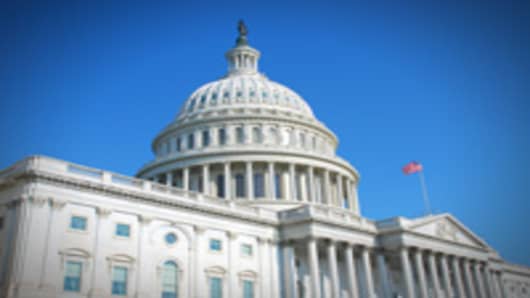Congress should allow regulators to do their jobs in supervising banks and it must regulate over-the-counter derivatives to prevent a repeat of the financial crisis, Dick Bove, financial strategist at Rochdale Securities, told CNBC Monday.
So far, regulators have been hampered by the legislature because Congress did not want regulators looking at banks' prudential ratios and telling them they had over-extended for fear that this would cause a slowdown in lending to the economy, Bove said.
"I think Congress needs to act very aggressively in this area of derivatives… but I think that the regulators should be left to do their jobs in controlling banks," he added.
The financial reform draft bill of Senate Banking Committee Chairman Christopher Dodd (D-Conn.) will be unveiled at 2 pm New York time.
The bill calls for a new systemic-risk council with a chairperson appointed by the president and seven other members, a source told CNBC.com.
It will also call for a consumer protection agency which would be housed in the Federal Reserve and would have rule-making, but not enforcement authority,
"The bill doesn't do a whole lot of anything compared to where we were six months ago… it will give the Fed more power, which I find incredible," Christopher Whalen, senior vice-president at Institutional Risk Analytics, told CNBC.
"Congress is doing basically what the large banks want, it's my view," Whalen told "Squawk Box."
Fed Role Controversy
The Fed should focus on monetary policy and market surveillance, while consumer protection should go to the Federal Deposit Insurance Corporation (FDIC), Whalen said.
But Congress is likely to go with the version in which the Fed has more power because that's what the banks want, he added
Bove agreed that the financial industry prefers the Fed.
"The reason it loves the Fed you've clearly defined, because the Fed keeps its hands off the industry," Bove said.
"You know, the FDIC hasn't done its job either and the OCC (Office of the Comptroller of the Currency) has been asleep," he added.
Bove reiterated his view that banks that focus on capital markets are more likely to be stock market winners in the following years than consumer-oriented banks.
"The consumer is going to see bank branches close, it's going to see all kinds of fees," he said. "You want to buy the capital markets companies… you want to stay away from anything to do with the consumer."
Bove likes Goldman Sachs, JP Morgan, State Street and BB&T.
Citigroup would also be a good buy but only after the government sells its 7.7 billion shares in the bank, he said.
He repeated his worries regarding the real estate market saying that because of Fannie Mae and Freddie Mac, which by some estimates guarantee or own more than half the US mortgage market, the market was opaque.
"We don't know what real demand is, we don't know what real pricing is, we have no idea what will happen if the government stops supporting this market," Bove said.


